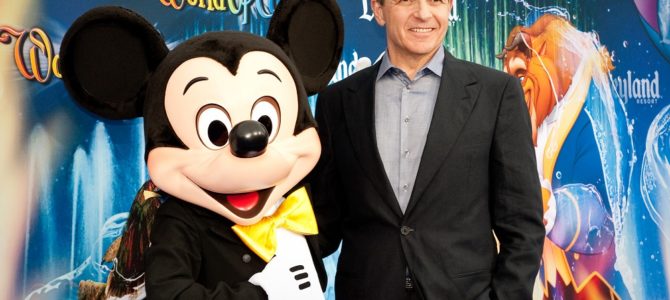
On Thursday, the U.S. vice president (and, full disclosure, my former boss) weighed into the ongoing controversy sparked by Houston Rockets General Manager Daryl Morey’s criticism of Communist China’s dictatorship. In a speech on China policy, Vice President Mike Pence rightly pointed out that, in the aftermath of Morey’s tweet, “some of the NBA’s biggest players and owners, who routinely exercise their freedom to criticize this country, los[t] their voices when it [came] to the freedom and rights of other peoples.”
The list of people who suddenly lost their voice includes one other notable name: Walt Disney Company CEO Robert Iger. (Full disclosure: I have owned a small number of shares of Disney stock, given to me by my mother, for several decades.)
Iger—whom Oprah Winfrey has reportedly “begged” to run for president—has spoken out on numerous political issues, including the United States’ withdrawal from the Paris climate accords. Just last week Iger, who received $66 million in compensation from Disney last year, spoke out against wealth inequality and in favor of “a tax plan that makes sense that transfers more wealth from a small set of individuals to a larger set of individuals.” No word on why concerns over inequality didn’t compel Iger to renounce or give away his $66 million.
But on the situation in China, Iger has suddenly turned mute—a fact one easily attribute to Disney’s two Chinese resorts (in Shanghai and Hong Kong), and ESPN’s partnership with the NBA. Iger claimed in remarks Tuesday evening that, with actions that could anger China’s Communist dictatorship, “Caution is imperative. To take a position that could harm our company in some form would be a big mistake. I just don’t believe it’s something we should engage in in a public manner.”
Some would argue that Disney’s silence—particularly given the company’s, and Iger’s, insistence on being woke on just about every other issue—is harming the company. That hypocrisy doesn’t represent the only irony related to Iger’s comments, either.
Walt Disney Fiercely Opposed Communism
By attempting to appease China’s Communist dictatorship, Iger directly contradicted the history of the company’s founder. Walt Disney loudly and vocally opposed Communism, prompted in part by an ugly labor dispute that plagued his studio in 1941, and which Disney attributed to Communist agitators.
Disney helped found the Motion Picture Alliance for the Preservation of American Ideals, testified before the House Un-American Activities Committee in 1947, and gave J. Edgar Hoover and the FBI names of individuals in Hollywood he believed to be Communists. According to the Bureau’s files, Disney even went so far as to offer FBI agents “complete access to the facilities of Disneyland for use in connection with official matters and recreational purposes.”
In recent years, some have criticized Disney for his anti-Communist actions during the postwar period, arguing that he helped to blacklist actors and other artists within the motion picture industry. But even if one assumes that Disney’s aggressive tactics led to unintended consequences, Iger’s absolute silence as the Chinese regime silences dissent—in Hong Kong and elsewhere—still seems deafening by comparison. It also presupposes, quite naively, that the Communist regime’s disregard for the rule of law in crushing protestors will not harm Disney and other companies’ ability to conduct their business.
Plays into an Anti-Semitic Stereotype
In February, Rep. Ilhan Omar (D-MN) sparked a major controversy when, in response to why members of Congress defend the state of Israel, she posted in a since-deleted tweet that “it’s all about the Benjamins, baby:”

Omar’s tweet aroused such anger, and prompted a vote on a House resolution condemning anti-Semitism, because it played into the stereotype that individuals of Jewish ancestry care about money first and foremost.
While some individuals involved in the China controversy, such as LeBron James, have no discernible Jewish ancestry, both NBA Commissioner Adam Silver and Iger do. Particularly because Iger received a humanitarian award in 2012 from the USC Shoah Foundation—presented by none other than Stephen Spielberg—one would think he would show some outward concern for an authoritarian regime that places an ethnic minority (the Uighurs) into the modern equivalent of concentration camps.
Iger said he spoke out in favor of legal advantages for young people brought to the United States illegally in their youth, because “I felt I owed it to them to stand up on their behalf.” But Iger will not speak up on the Uighurs’ behalf for financial reasons, thereby playing into the exact stereotype Omar criticized earlier this year. For that reason—and many others—the silence of Iger and his ilk represents a shameful act of cowing to China’s Communist dictatorship.









